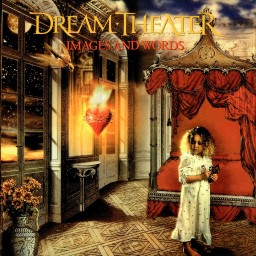 Review by SilentScream213 for Dream Theater - Images and Words (1992)
Review by SilentScream213 for Dream Theater - Images and Words (1992)
Images and Words is kind of the first Progressive Metal album of the white collar, semi-symphonic ballad heavy variant. While Dream Theater’s debut was a pretty generic slice of first wave Prog Metal, here Dream Theater take a cue from the likes of Queensryche and Fates Warning, adding strong, anthemic choruses and near-Pop commercial sensibilities, though retaining the later band’s complex songwriting and musicianship. More interestingly, they borrow Savatage’s melodramatic balladry, and bring a strong ensemble of keys, strings, sax, and probably a bunch of other instruments to the mix.
New (and now long-time) Vocalist James LaBrie adds a signature charisma to the vocal delivery, with an impressive range and strong lyrical chops. Instrumentally, it’s not in the overtly technical territory of prog wankery, and rather the band does a great job of servicing the song as needed, and showing off when appropriate. There’s also a huge variety to the songs here, and they pull off just about everything they try their hand at. There’s epic songs, somber songs, sappy songs, serious songs… and tons of different styles, all wrapped in that signature Prog Metal package. The band is so instrumentally entertaining that they actually make a cheerfully cheesy wankfest in “Take the Time” that manages to be a total delight from start to finish.
There really isn’t a wasted minute here, and the penultimate track “Wait for Sleep” is proof of that. Normally, 2 minute non-metal interludes on Metal albums are terrible wastes of space that just slow things down, but this one is a beautiful piano-vocal duet that not only sets the mood perfectly for the last track, but is a memorable piece of beauty in it’s own right. And that last track, “Learning how to Live,” is definitely the band’s greatest achievement as of release. Perfect closer that goes through a total range of moods and styles in it’s 11 minute runtime, never overstaying it’s welcome.
